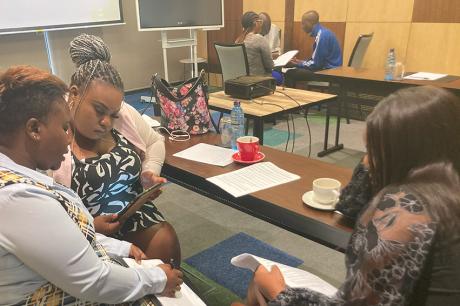
Brian Robinson and twin Florence Uzabakirih
Published June 25, 2013, last updated on April 9, 2018 under Voices of DGHI
By Brian Robinson
From the beginning of the Rwanda Human Resources for Health (HRH) Program, primary stakeholders, the Ministry of Health in Rwanda and U.S. home institutions – including Duke University-- have envisioned the side-by-side mentoring of Rwandan faculty that enables the transfer of skill from U.S. faculty to their Rwandese counterpart. As with all new programs, those on the ground had to realize that vision is a guide, not necessarily a hard fast rule. All programs have been able to adjust the idea of “twinning” to meet the needs of Rwandan institutions and U.S. home institutions. While there are many forms of successful twinning occurring in Rwanda, the internal medicine department at CHUK (Kigali University Teaching Hospital) is working hard to keep that mentoring model.
Through Duke University, I have spent the last year working in Rwanda alongside my twin – Rwandan internal medicine physician Dr. Florence Uzabakiriho. Dr. Uzabakiriho is a new staff member at CHUK and has a personal interest in Endocrinology. She is a bright and motivated new graduate who in addition to learning a lot of endocrinology over this past year has been a great teacher for both post-graduate medical residents and myself. Internal medicine in Rwanda is not always the same as it is in the U.S., and I have often found myself to be the student rather than the teacher in our relationship.
Over the past nine months, my twin and I have focused on trying to start what seemed at the time to be simple projects, but have become significant to our department and our patients. Our first goal was to start an Endocrinology clinic where, first, my twin would be responsible for seeing endocrine patients in the outpatient setting and two, would also give a place for first-year post-graduates to encounter complex endocrine patients in a controlled and supervised setting.
Our second goal was to start a neck ultrasound and biopsy clinic. This clinic was intended to provide neck ultrasound and thyroid and/or lymph node biopsies to internal medicine patients. Our neck U.S. clinic is now once per week and is not only receiving referrals from teaching facilities (Rwanda Military Hospital, King Faisal Hospital and CHUK), but also from outside private clinics. Previously, patients had to wait weeks to months for an outpatient neck ultrasound and then another couple weeks for a biopsy appointment with ENT, pathology or radiology. This clinic has allowed patients faster access to care and faster diagnosis by allowing them to have the ultrasound and the biopsy done on the same day by the same doctor. Because we use internationally-recognized Endocrine Society guidelines for the evaluation and care of thyroid nodules and cancers patients can have more disease directed care after their diagnosis. Since September 2012, we have done more than 200 neck ultrasound and biopsies in our new clinic and are well on our way to breaking 400 by the end of the first year.
As we plan for the future, we have decided to make year two “The Year of Diabetes.” We hope to expand our idea of the endocrine clinic into a second clinic specifically for the care of diabetic patients. During the past year, my twin and I have been involved in a diabetic study that explores the effect of diabetes education on blood sugar control in diabetic patients. Although the final outcomes of this study are objective, we had a chance to ask the patients how they felt the education program has impacted them thus far. The most striking response was, “I used to be depressed all the time, and sometimes I thought, I wish I had HIV instead because there is more help and awareness for those patients.” After this type of feedback, we realized that diabetics in Rwanda are in need of “community” and need to feel like their doctors, their hospital and their country are behind them and care about providing care that is at least equivalent to care provided for other diseases. So, we want this year to be a year of diabetes. We want post-graduates to learn about long-term care of patients and to understand the idea that disease may not be treated or cured with 15 days of medicine.
As Rwanda positions itself to become a developed nation, we are excited because people realize that means a better quality of life for its citizens. Yet there are consequences of being a member of that club: non-communicable diseases are racing to fill in the gaps left by the reduction in HIV infections and other infectious diseases. Rwanda, like most of Africa, is on the verge of a new endemic, one of non-communicable diseases.
Africans could otherwise find themselves left at the starting gates, unable to keep up with the rising tide of diabetes and heart disease. But, the foresight of Rwandan health leaders and important global initiatives like the Rwanda HRH Program, with partners from Duke University, will help Rwanda get ahead of the race.
Learn more about the Rwanda HRH Program and Duke's involvement.


